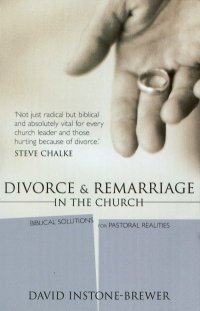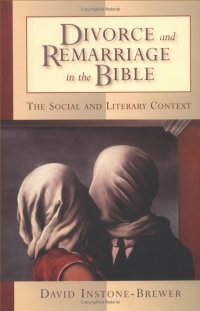

|
Reviews
Divorce and Remarriage | ||

|
Adrian Thatcher INTAMS Review, 9 (2003) (International Academy for Marital Spirituality) |

|
| Full review: | ||
|
The purpose and conclusions of this fine, immensely detailed study are stated clearly at the outset. The purpose "is to understand the meaning of the New Testament teaching on divorce and remarriage as it would have been understood by its original readers". And the conclusions arc (1) "both Jesus and Paul condemned divorce without valid grounds and discouraged divorce even for valid grounds"; (2) "both Jesus and Paul affirmed the Old Testament grounds for divorce"; (3) "the Old Testament allowed divorce for adultery and for neglect or abuse"; (4) "both Jesus and Paul condemned remar-riage after an invalid divorce, but not after a valid divorce" (ix). As the author admits, "these conclusions are very different from the traditional Church interpretation of the New Testament texts". A compendious exegesis of these, in their Hebrew and Greek contexts, then follows, while the later chap-ters of the book "trace the conse-quences of neglecting the cultural background of the text" (x). The tradition of the Church is said to be "completely different", and the author's hope for his work is that it "will give a biblical foundation to Church leaders and individuals who are seeking to evaluate that tradi-tion for themselves" (xi). The chapters treat marriage and divorce from various perspectives: (1) The Ancient Near East: Mar-riage is a Contract; (2) The Pentateuch: The Divorce Certificate Allows Remarriage; (3) The Later Prophets; Breaking Marriage Vows is Condemned; (4) Intertestamental Period; Increasing Rights for Women; (5) Rabbinic Teaching: Increasing Grounds for Divorce; (6) Jesus' Teaching: Divorce on Bib-lical Grounds Only; (7) Paul's Teaching: Biblical Grounds Include Neglect; (8) Marriage Vows: Vows Inherited from the Bible and Judaism; (9) History of Divorce: Interpretations in Church History; (10) Modern Reinterpretations: Dif-ferent Ways to Understand the Bib-lical Text; and (11) Pastoral Con-clusions: Reversing Institutionalized Misunderstandings. It is impossible, in a short review, to do justice to the close arguments and minute details of this work. Jesus' teaching is said to have become "utterly incompre-hensible" after 70 CE and "Mark's account could not be understood at all" (139). Because "the NT was written for first century readers" (294), list century readers are made to depend on the skills of biblical interpreters in using standard his-torical-critical methods both to arrive at the authorial intentions of the biblical writers, and to under-stand the complex cultural milieux in which they are set. I.'s own view, based on his detailed investigation of biblical sources, is that in the contemporary Church divorce should be "avoided and restricted to biblical grounds". He thinks "Jesus and Paul affirmed all four OT grounds for divorce and remarriage [adultery, and neglect of food, clothing, and love] while emphasizing that divorce should be avoided whenever possible and that believers should go the extra mile in trying to maintain a marriage" (299). He raises the question, rather bravely, whether perhaps "the Holy Spirit would not have allowed the Church to be confused about such an important matter for so many centuries" (304), but sides with the biblical scholars in interpreting scrip-ture directly, rather than through tradition. His pastoral conclusions and recommendations regarding divorce and remarriage are sensitive and consistent, and based in part on his own experience as a Baptist minister. One must wonder whether any interpretation of the relevant bib-lical texts can be as convincingly better than any of the others as this author thinks. The hermeneutic presuppositions on which the argu-ment is carried forward into post-modernity remain undeveloped. Nonetheless I think this is an out-standing book, certain to influence contemporary understanding of the relevant biblical texts, and making an important contribution of what to do about them. Adrian Thatcher, Plymouth
|
||
| Read more reviews... | ||
Version
-for ministers
-for academics
-for everyone
Summary
Questions/
Comments
& Replies